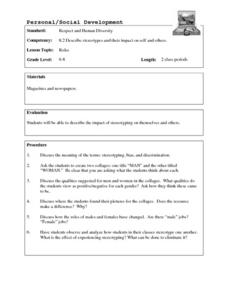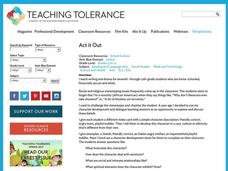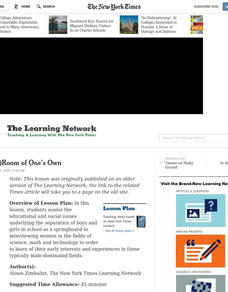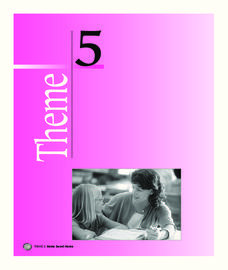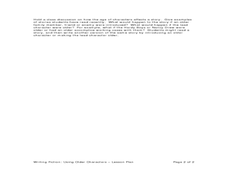Media Smarts
TV Dads: Immature and Irresponsible?
Examine gender stereotypes on television, focusing on fathers portrayed in sitcoms and advertising. Questions on a handout direct learners to consider the types of fathers they see on television and one advertisement is highlighted as...
Teaching Tolerance
Parallels Between Mass Incarceration and Jim Crow
Is history repeating itself? A riveting lesson examines the parallels between mass incarceration in the U.S. and the Jim Crow Laws of the past. Academics review Jim Crow Laws and compare them to mass incarcerations of African Americans....
Curated OER
Five "E" Lesson-Stereotypes
Learners discuss the nature of stereotyping and prejudicial behavior and their feelings regarding people with visible disabilities. They view part of documentary Graduating Peter then work in groups to chart people's reactions and...
Curated OER
What Do Halloween Costumes Say?
Students analyze Halloween costumes they find in magazines to categorize their findings. In this holiday lesson, students discuss their findings about the costumes based on four different elements.
Curated OER
First Nations in the Media
Students analyze the portrayal of Aboriginal people in the media. In this stereotype identification lesson plan, students investigate the ways the media represents Aboriginal culture. Students use the Internet to research, and present...
Curated OER
The Big, Bad Wolf
Seventh graders analyze the stereotyping of wolves in children's literature. They compare stereotypes and facts about wolves. They rewrite a fairy tale from the wolf's point of view.
Curated OER
Those Who Don't Know: Identity, Membership, and Stereotypes
Students explore their identities. In this social studies lesson, students examine stereotyping and discuss factors that define their personal identities. Students compare their stories to the story of Esperanza in the novel Esperanza...
Curated OER
Our Computers, Ourselves: Imagining the Digital Lives of Authors and Characters
The guiding question for this lesson plan is "Do computers and their contents shape who we are?" Open with a selection of Apple's commercials to introduce stereotypes and people's relationships with their computers. Then, read the...
Curated OER
Words Can Hurt: King Day (4th)
Students study stereotypes and write about how to end stereotyping. In this stereotypes lesson, students study a T-chart about boys and girls stereotypes. Students then discuss stereotypical phrases. Students discuss Martin Luther King,...
Curated OER
Roles
Students discuss the meaning of the words: stereotypes, bias, and discrimination. They create two collages, one for women and one for men. They brainstorm ideas on why they picked the pictures they did.
Curated OER
Act it Out
High schoolers discuss racial stereotypes. In this racial stereotypes lesson, students develop a character from information given to them on an index card. High schoolers give their character a race different from their own and write a...
Curated OER
A (Class)Room of One's Own
Learners assess the educational and social issues of boys and girls in school as a springboard to interviewing women in the fields of science, in order to study of their early interests and experiences in these typically male-dominated...
Curated OER
Discrimination
Students examine concept of discrimination and explore difference between appropriate and harmful discrimination. Students discuss relevant Australian legislation and International Law, choose example of discrimination, and write...
Curated OER
Prejudice
Students read story, Nipper, and explore and demonstrate understanding of concept of prejudice. Students create definition of prejudice, and describe negative experiences they may have had with people who are different from themselves,...
Curated OER
Othello's Predecessors: Moors in Renaissance Popular Literature
High schoolers gather textual citations from Othello, discuss stereotypes that they hold, examine primary source materials, and write character profiles.
Curated OER
Discrimination Hurts
Fifth graders interpret stereotyping and discrimination as limiting and hurtful behaviors and demonstrate how to address these behaviors in a positive manner. In this discrimination lesson plan, 5th graders use the poem The Woman Who...
Curated OER
Quality of Information: Point of View and Bias
Fifth graders identify stereotypes of Indian people based on perceived characteristics. They discuss the misconceptions. Students define quality of information and give an example from the story "Seaman's Journal: On The Trail With Lewis...
National Endowment for the Humanities
Harriet Jacobs and Elizabeth Keckly: The Material and Emotional Realities of Childhood in Slavery
Young historians learn how to make generalizations based on primary sources in a instructional activity that uses the autobiographies of two women born into slavery. The class watches a historical re-enactment of scenes from the lives of...
Curated OER
Fallacies of Weak Induction
A high-level introduction to fallacies of weak induction, including appeals to unqualified authority and ignorance, hasty generalizations, and weak analogies. Each fallacy is defined and shown with an example. For use mostly in college...
Houghton Mifflin Harcourt
Home Sweet Home: Extra Support Lessons (Theme 5)
Home Sweet Home is the theme of a unit comprised of extra support lessons. Scholars reinforce concepts through chants, grand discussions, and practice worksheets. Topics include digraphs, blending phoneme, long vowels, final sounds,...
Teaching Tolerance
Dismantling Racial Caste
It's time to end racism. The final installment of the series encourages scholars to consider what is needed to ended the racial caste system in the U.S. Young historians complete group discussion, written prompt, and a hands-on-activity...
Curated OER
Stereotype Characters Activity
Here is a lesson designed for middle schoolers which helps them recognize stereotypes one way or another against a particular group of people. They also determine what may have motivated the author to use a stereotype in the first place....
Denver Art Museum
Putting Images into Words
Engage your class in art analysis of Indian Look-Alike by Melanie Yazzie. Using this work of art as inspiration, writers compose a poem or short story. After a peer review session, the teacher conveys information about the work of art as...
Curated OER
Writing Fiction: Using Older Characters
Out with the old and in with the new? Not so in this lesson plan, which explores the idea of writing older characters in fiction. Students learn the value of varying their characters, exploring different perspectives, and avoiding...
Other popular searches
- Stereotypes in Disney Movies
- Female Stereotypes
- American Indian Stereotypes
- Racial Stereotypes
- Cultural Stereotypes
- Native American Stereotypes
- Esl Lessons on Stereotypes
- Stereotypes in Literature
- Role Play Stereotypes
- Lessons on Stereotypes
- Holiday Stereotypes
- Hate Crimes and Stereotypes











